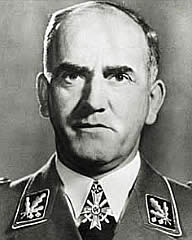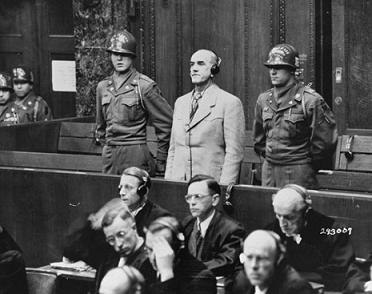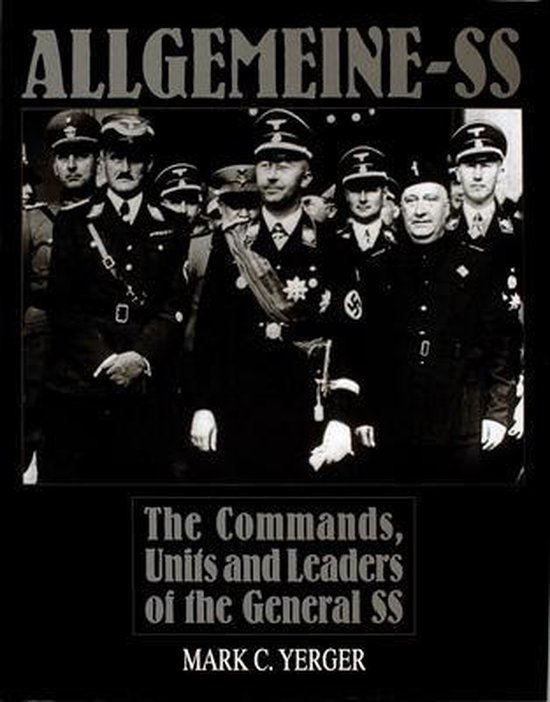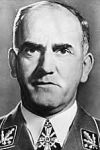June 30, 1892 - June 8, 1951.
Career in the Kriegsmarine
Oswald Pohl was born June 30, 1892 in Duisburg-Ruhrort, Germany, the fifth child of blacksmith Otto Emil Pohl and his wife Auguste Pohl-Seiffert. He attended elementary school in Duisburg-Laar from 1898 to 1904. Subsequently he attended the Real gymnasium in Duisburg-Hamborn for seven years. In his own words, he was a rather good pupil and took his diploma at the age of 20. On April 1, 1912 he embarked on a career in the German Kriegsmarine. His training took place in Wilhelmshafen and Kiel as well as in the Pacific. During World War One he was stationed on the Flemish coast and sailed on the Baltic Sea for some time.
Pohl started his career in the Kriegsmarine as Zahlmeister-Aspirant – apprentice paymaster - , in rank equal to ordinary seaman. After training at the Kriegsmarine Akademie in Kiel he was appointed Zahlmeister on April 1, 1918. Owing to his clerical function, he spent much of time as a navy man ashore, particularly in Kiel. In 1919 and 1920 he took courses at the trade school in his spare time. He also started to study law and economic science at the Christian Albrecht University in Kiel but he would never graduate. During this period he was also active in the Freikorps Brigade Löwenfeld. This Freikorps was commanded by navy officer Wilhelm Löwenfeld and consisted of navy personnel. Just like all other Freikorpse, the Brigade was deployed to curb Communist uprisings. In the Weimar period, Pohl evolved into an opponent of the Weimar Republic. These feelings would soon result in a membership of Adolf Hitler’s party.
Transfer to the SS
In 1925, Pohl had joined the SA and the next year, he became a member of the N.S.D.A.P., membership number 30842. From 1925 to 1929 he was SS-Ortsgruppenleiter of the N.S.D.A.P. and SA-Führer in Swinemünde where he lived at the time. Navy officers were not allowed to join a political party but as Pohl was employed as pay master he was considered a navy official and not an officer. Later on, navy officials would also be prohibited to join a political party but then, Pohl’s transfer to a permanent employment within the SS was almost complete.
The occasion for his transfer from the Kriegsmarine to the SS was a meeting Pohl had with Reichsführer-SS Himmler (Bio Himmler) in May 1933. Himmler accompanied Hitler (Bio Hitler) during an inspection of the Kriegsmarine in Kiel and tackled Pohl about a letter Pohl had sent him six months previously. In this letter Pohl wrote about the rumors he had heard about the former navy officer Reinhard Heydrich (Bio Heydrich). Heydrich had risen to chief of the Sicherheitsdienst (SD) in the SS in the meantime and was one of Himmler’s most important and powerful associates. According to Pohl, all kinds of rumors were circulating as to Heydrich’s discharge. Heydrich would have been dishonorably discharged for having ended relationships with women in an immoral way and for having bad traits of character. Pohl was being ridiculed by his navy colleagues: they claimed that only that only failed navy personnel joined the SS – Pohl was a member of the SS, number 147614, as of November 1933 in the rank of SS-Sturmbannführer or the N.S.D.A.P. Although Pohl did not know whether the rumors about Heydrich were true or not, he wanted to warn Himmler in any case. He thought a man unworthy to wear the navy uniform should not serve in the SS either.
In his conversation with Pohl in Kiel, Himmler acknowledged the existence of the rumors about Heydrich but he had conducted a personal investigation into Heydrich’s past in the navy and could guarantee the rumors were incorrect. Himmler also took the advantage to offer Pohl an executive clerical function in the SS. Himmler told him to think this offer over carefully. In order to strengthen his offer and to convince him, Himmler wrote letters to Pohl regularly. In December 1933 and January 1934 Himmler invited him to visit SS headquarters in Berlin and Munich. Pohl was shown around and was made familiar with the administrative structure of the SS and the many and complex problems that came with it. After he had taken enough time to think about the vacancy in the SS, Pohl entered permanent service in the SS on February 1, 1934 in the rank of SS-Standartenführer. It goes without saying he could not continue his navy career any longer and on January 1934 he left the Kriegsmarine in the rank of Stabszahlmeister, equal to Kapitänleutnant.
Chief administrator of the SS
As already mentioned, Pohl started his career in the SS in the rank of SS-Standartenführer. Within the staff of the Reichsführer-SS he became head of the administrative department. He was tasked with the organization of the economic and administrative departments of the SS. In that capacity, he had an important influence on the administrative organization in the concentration camps. This organization was still rather simple at the time and Pohl was given the all encompassing task to reorganize and set up the clerical side of the SS. He established clerical departments in various important German cities, selected personnel that could handle the direction of these offices and set up schools where these clerical functionaries could be trained. He said later, his role within the SS was to make the organization healthy in an administrative sense with correct bookkeeping and financial departments. From the start of his work in the SS, it was Pohl’s task to make the SS profitable so the independence towards the party as well to the government would be guaranteed.
Pohl’s efforts did not remain unnoticed and on June 1, 1935, he was appointed Verwaltungschef der SS and Reichskassenverwalter der SS (chief cashier). In 1936, he was also charged with the responsibility of the IKL – Inspektion der Konzentrationslager or Inspectorate of the concentration camps – charged with administration and inspection of all concentration camps. That same year, Pohl was named company executive of the Gesellschaft zur Förderung und Pflege Deutscher Kulturdenkmäler e.V. – Association for the promotion and care of German memorials. Himmler was obsessed with buildings reminiscent of the bygone days of German knighthood and wanted to preserve medieval castles such as the SS-Ordensburg Wewelsburg as ideological and focal points of the SS cult. It was Heinrich Himmler’s task to raise funds within this organization to finance the maintenance and management of these buildings.
Pohl’s clerical department as part of the SS-Hauptamt (head office) was still not a separate department in the SS. From 1934 onwards though, major changes were made to the tasks of this financial department. The military branch of the SS, the SS-Verfügungstruppe (SS-VT) had been established which was financed by the state, in contrast to other parts of the SS. This caused an expansion of Pohl’s sphere of work and he was to manage the party budget of the SS as well as its state budget. Hence, from 1939 onwards, he held two functions: one within the SS and another in the Innenministerium (Department of the Interior). In the SS, Pohl held the function of head of the Hauptamt Verwaltung und Wirtschaft (main office of administration and economics) and within the Reichsinnenministerium he was chief of the Hauptamt Haushalt und Bauten (Budget and Construction). In this capacity he quickly established various SS enterprises with the help of Nazi followers from German industry.
Chief of the SS-Wirtschafts- und Verwaltungshauptamt
On January 31. 1942, all of Pohl’s responsibilities were merged into one separate department of the Reichsführung-SS. The SS-Wirtschafts- und Verwaltungshauptamt (Main Administrative and Economic Office) was one of the 12 main offices of the SS and naturally, Pohl was appointed chief of this main office. In addition to the responsibility for various economic and administrative issues, Pohl was put in charge of all concentration camps within the SS-WVHA. Until 1942 he was only responsible for the inspection of the camps but now his agency was also in charge of the management of the camps and the deployment of prisoners in forced labor. After the war Pohl claimed that leadership of the concentration camps had been shoved onto him against his will. It was probably his efficient way of doing things he was given this responsibility as well.
The inmates from the concentration camps were deployed in enterprises managed by the SS and in other enterprises. In his capacity as chief of Amt W (Wirtschaftsunternehmen) within the SS-WVHA, Pohl was manager of some 30 enterprises like the Deutsche Aufrüstungswerke in Dachau and Oranienburg and the Deutsche Stein- und Erdwerke in Oranienburg. These factories produced weaponry and munitions. Prisoners were hired out as forced laborers to private German enterprises as well. Apart from a few positive exceptions, working conditions in the factories and living conditions in the concentration camps were bad in the extreme. Malnutrition, overexertion and maltreatment claimed the lives of large numbers of forced laborers.
Pohl’s relation to Himmler
Being chief of the SS-WVHA, Pohl was one of the most powerful and important leaders in the Reichsführung-SS. Pohl was in direct contact with Himmler. After the war, he told he saw Himmler continuously at the start of his career and later, when he was given his important functions, he had a meeting with the Reichsführer-SS every three months. On April 20, 1942, Pohl was promoted to SS-Obergruppenführer und General der Waffen-SS, making him equal in rank to Reinhard Heydrich for instance. Despite Heydrich being the most important man in the SS, second only to Himmler, in some aspects, Himmler could lean more on Pohl. The intelligent Heydrich had risen to a position within the SS where he was powerful and independent. Himmler may well have been his boss but Himmler never had complete control over him. Pohl on the contrary was aggressive and demanding towards his subordinates and officials of party and government but he accepted Himmler’s leadership unconditionally. He considered every wish of Himmler an order and would not allow any criticism be voiced about his boss. Historian Richard Breitman even claims in his biography of Himmler that Pohl was to Himmler what Himmler was to Hitler until very late in the war.
A fine example of the mutual bond between Himmler and Pohl is his marriage to wealthy Eleonore von Brüning. Pohl had already married on October 30, 1918 but after his divorce in 1936, he lived as a bachelor. In March 1942, Himmler suggested Pohl he should pay a visit to the widow Von Brüning whom he held in high regard. This suggestion did not remain without consequence as Pohl and Eleonore von Brüning were married on December 12, 1942. The wedding ceremony took place at Himmler’s field headquarters. An additional advantage to Himmler was that Eleonore von Brüning was the widow of Ernst Rüdiger von Brüning, the son of one of the founders of the firm Hoechster Farbwerke. From 1925 onwards, this firm was part of the important German enterprise IG Farben. The marriage between Pohl, a prominent SS leader and this woman with an influence on IG Farben was, in Himmler’s view, very advantageous to the SS.
The SS-WVHA and the Endlösung
Within Amtsgruppe D 1 of the SS-WVHA, SS-Brigadeführer Richard Glücks (Bio Glücks) was responsible for the management of the concentration camps. Around 1942 though, extermination camps were established and policy towards non-Jewish prisoners in particular changed. While in concentration camps inmates mainly perished because of the abysmal conditions, in extermination camps, Jews were consciously and efficiently murdered in gas chambers according to a well organized and assembly line procedure. The Endlösung was not the main goal of the SS-WVHA but of the RSHA (Reichssicherheitshauptamt or main office of state security). Pohl’s office however did provide logistic and administrative support to the Endlösung and tried in all manners possible to make a profit out of the mass murders in the concentration camps.
Hence Pohl proposed to send back to Germany all personal belongings of Jews who had been gassed in the extermination camps in Poland. Objects such as gold teeth, clothing, wedding bands, other jewelry and foreign currencies were taken away from the deportees. Even the hair of people was shaved off to be sold to the clothing industry before they were gassed. After the war, during a conversation in Nuremberg jail with prison psychiatrist Leon Goldensohn, Pohl stated he had never given the order to take gold teeth away from the victims. He did acknowledge he knew about the confiscation of gold teeth though and stated: "They were there anyway and I had to take them to the Reichsbank, so I did. I have never personally inspected those gold teeth and bridges because I was too busy with other things. Do you think I would go down myself to unload those trucks and open the bags in order to check what was in there? I was a very busy chief."
As to the Endlösung, after the war Pohl attempted to exonerate himself doggedly. He pushed the guilt off to his subordinate Richard Glücks and said he felt himself too weak to carry out this horrible task. The mass extermination of Jews was the business of the RSHA and orders from this office to the SS-WVHA did not end up on his desk but that of Glücks. Moreover, from an economic point of view, it was not advantageous to Pohl to kill prisoners fit for labor in their masses because he could make better use of them in the armaments industry. Although it can be assumed that Pohl was not directly involved in the organization of mass murders in the extermination camps, he was first and foremost Glücks’ boss who was involved in the Endlösung in a certain way. Secondly, he must have known about the mass murder of Jews from an early stage and in the third place, the high mortality among forced laborers, for which he did acknowledge responsibility, was part of the organized murder within the Third Reich.
The fact Pohl knew about the plans that would lead to the murder of 6 million Jews at an early stage is proved by the seventh point on the agenda of a meeting Pohl and Himmler had on December 5, 1939. The subject was crematorium and provisions for delousing. Sure enough, crematoriums were in use to cremate the large numbers of prisoners who had perished because of the bad situation in the camps. It was the most expedient way to get rid of the corpses as burying them caused practical and hygienic problems. Many camps had their own crematoriums. There were also huge numbers of lice in the camps and delousing measures were taken. There is however no sensible connection between delousing and crematoriums and Himmler joined both words with a hyphen because it concerned one and the same operation. This point on the agenda is the earliest evidence of the plans to use poison gas as a murder weapon and crematoriums as a means to subsequently destroy the corpses.
During his imprisonment in Nuremberg, Pohl told prison psychiatrist Goldensohn he as a human being had always considered the mass extermination of Jews a repugnant idea. He said: "If I had known in 1934 what I know now, I would have stayed in the navy. I did not know this was going to happen and I did not know Germany was to lose the war and be destroyed. [..] If I had been a real anti-Semite I would have hated the Jews but I never hated them. I only followed orders. My conscience is clear. I have never ordered to kill a Jew or killed one myself. I have explained already that the extermination program did not come under my jurisdiction but that it passed me by."
After the war
In the first months after the war, Pohl and his family lived in the Bavarian village of Halfing near Rosenheim. He worked on a farm and spent the best part of his time there. Using a false name and with forged papers he subsequently walked from village to village in northerly direction and eventually ended up in the vicinity of Bremen. In each village he reported to the local police station and was given new papers each time with his false name on them. This increasing amount of papers made his flight easier but eventually, on May 27, 1946, he was arrested anyway by British authorities.
Between April 8 and September 22 1947, Pohl stood trial in the so called WVHA trial, also known as the Pohl trial. This trial was the fourth out of 12 trials the American authorities held in Nuremberg after the main trial against the major war criminals had finished. In addition to Pohl, 17 other SS men who had worked for the SS-WVHA stood trial as well. Pohl and his associates were indicted for war crimes and crimes against humanity, committed during the Nazi regime. The major indictment focused on their role within the Endlösung. Pohl was found guilty of war crimes, crimes against humanity, membership of a criminal organization (the SS), mass murder and crimes committed in the concentration camps for which he bore the responsibility. Along with three other workers of the SS-WVHA, Pohl was sentenced to death on November 3, 1947. Three other defendants were acquitted and the others were sentenced to prison terms varying from ten years to life.
Pohl’s execution by hanging took place in Landsberg am Lech in Bavaria, June 8, 1951 as the defendants were allowed to submit new evidence after their conviction. Until that time, he wrote his book "Credo, Mein Weg zu Gott" (Credo, my way to God), which was published with permission of the Roman Catholic Church. In 1936 he had left the church but during his imprisonment he converted to Catholicism again. Up until the last day of his life, Pohl insisted on being innocent. He had been just an administrator, a common worker who, in his own words, had had nothing to do with the Endlösung and the Nazi terror in the concentration camps.
Read more about the decorations of this person on WW2Awards.com
Definitielijst
- Brigade
- Consisted mostly of two or more regiments. Could operate independently or as part of a division. Sometimes they were part of a corps instead of a division. In theory a brigade consisted of 5,000 to 7,000 men.
- crimes against humanity
- Term that was introduced during the Nuremburg Trials. Crimes against humanity are inhuman treatment against civilian population and persecution on the basis of race or political or religious beliefs.
- Endlösung
- Euphemistic term for the final solution the Nazis had in store for the “Jewish problem”. Eventually the Endlösung would get the form of annihilating the entire Jewish people in extermination camps.
- Freikorps
- German paramilitary units established directly after the Great War by former front soldiers. These groups were often named after their commander. Freikorps formed the basis of the eventual SA or Sturmabteilung.
- Führer
- German word for leader. During his reign of power Adolf Hitler was Führer of Nazi Germany.
- Jews
- Middle Eastern people with own religion that lived in Palestine. They distinguished themselves by their strong monotheism and the strict observance of the Law and tradition. During World War 2 the Jewish people were ruthlessly persecuted and annihilated by the German Nazis. . An estimated 6,000,000 Jews were exterminated.
- Kriegsmarine
- Germa navy. Part of the Wehrmacht next to Heer and Luftwaffe.
- Nazi
- Abbreviation of a national socialist.
- RSHA
- Reichssicherheitshauptamt. The central information and security service of the Third Reich.
- Sicherheitsdienst (SD)
- The national socialistic intelligence and counterespionage service of the SS.
- Waffen-SS
- Name of Military section of the SS.
- war crimes
- Crimes committed in wartime. Often concerning crimes committed by soldiers against civilians.
- Weimar Republic
- Name for the German republic from 1919 until 1933. Hitler ended the Weimar republic and founded the Third Reich.
Images
Information
- Article by:
- Kevin Prenger
- Translated by:
- Arnold Palthe
- Published on:
- 19-01-2025
- Feedback?
- Send it!













